- Home
- Brian Keene
Tequila's Sunrise Page 5
Tequila's Sunrise Read online
Page 5
We gathered around the spot in the woods; me, Daddy, Betsy, and my older brother Billy. Betsy is six, I’m nine, and Billy is eleven. Betsy, Billy and Benny—that’s what Mom had named us. Daddy said she liked names that began with the letter ‘B’.
Betsy’s eyes were big and round as she lay down inside the wooden box. She clutched her water bottle and the little bag of cookies that Daddy had given her. The other hand held her stuffed bear. He was missing one eye and the seams had split on his head. He didn’t have a name.
We closed the lid, and Betsy whimpered inside the box.
“Please, Daddy,” she begged. “Can’t I just stay up this once?”
“We’ve been over this. It’s the only way to keep you safe. You know what could happen otherwise.”
“But it’s dark and it’s cold, and when I go potty, it makes a mess.”
Daddy shivered.
“Maybe we could let her stay up just this once,” Billy said. “Me and Benny can keep an eye on her.”
Daddy frowned. “You want your little sister to end up like the others? You know what can happen.”
Billy nodded, staring at the ground. I didn’t say anything. I probably couldn’t have anyway. There was a lump in my throat, and it grew as Betsy sobbed inside the box.
We sealed her up tight, and hammered the lid back on with some eight-penny nails. There was a small round hole in the lid. We fed a garden hose through the opening, so Betsy could breathe. Then Daddy got his caulk gun out of the shed and sealed the little crack between the hose and the lid, so that no dirt would fall down into the box. Finally, we each grabbed a rope and lowered the box down into the hole.
“Careful,” Daddy grunted. “Don’t jostle her.”
We shoveled the dirt back down on her. The hole was about eight feet deep, and even with the three of us it took a good forty minutes. Her cries got quieter as we filled the hole. Soon enough, we couldn’t hear her at all. We laid the big squares of sod over the fresh grave and tamped them down real good. Made sure the hose was sticking out at an angle, so rainwater wouldn’t rush inside it. When we were done, Daddy gathered some fallen branches and leaves and scattered them around. Then he stepped back, wiped the sweat from his forehead with his t-shirt, and nodded with approval.
“Looks good,” he said. “Somebody comes by, there’s no way they could tell she’s down there.”
He was right. Only thing that seemed odd was that piece of green garden hose, and even that kind of blended with the leaves. It looked just like a scrap, tossed aside and left to rot.
“And,” Daddy continued, “it will take a long time to dig her back up. It would wear anybody out.”
We walked back up to the house and got washed up for dinner. I had blisters on my hands from all the shoveling, and there was black dirt under my fingernails. It took a long time to get my hands clean, but I felt better once they were. Daddy and Billy were already sitting at the table when I came downstairs. I pulled out my seat. Betsy’s empty chair made me sad all over again.
Dinner was cornbread and beans. Daddy fixed them on the stove. They were okay, but not nearly as good as Mom’s used to be. Daddy’s cornbread crumbled too much, especially when you tried to spread butter on it. And his beans tasted kind of plain. Mom’s had been much better.
Mom had been gone a little over a year now. Didn’t seem that long some days, but then on others, it seemed like forever. Sometimes, I couldn’t remember what she looked like anymore. I’d get the picture album down from the hutch and stare at her photos to remind me how her face had been. And her eyes. Her smile. I hated that I couldn’t remember.
But I still remembered how her cornbread tasted. It was fine.
I missed her. We all did, especially Daddy, more and more these days.
After dinner, Billy and me washed the dishes while Daddy went outside to smoke. When he came back in, we watched the news. Daddy let us watch whatever we wanted to at night, up until our bedtime, but we always had to watch the news first. He said it was important that we knew about the world, and how things really were, especially since we didn’t go to school.
Just like every night, the news was more of the same; terrorism, wars, bombings, shootings, people in Washington hollering at each other—and the pedophiles. Always the pedophiles... A teenaged girl had been abducted behind a car wash in Chicago. Another was found dead and naked alongside the riverbank in Ashland, Kentucky. Two little boys were missing in Idaho, and the police said the suspect had a previous record. And our town was mentioned, too. The news lady talked about the twelve little girls who’d gone missing in the last year, and how they’d all been found dead and molested.
Molested... it was a scary word.
Daddy said it was all part of the world we lived in now. Things weren’t like when he’d been a kid. There were pedophiles everywhere these days. They’d follow you home from school, get you at the church, or crawl through your bedroom window at night. They’d talk to you on the internet—trick you into thinking they were someone else, and then meet up with you. That’s why Daddy said none of us were allowed on the computer, and why he didn’t let us go to school. Child molesters could be anyone—teachers, priests, doctors, policemen, even parents.
Daddy said it was an urge, a sickness in their brain that made them do those things. He said even if they went to jail or saw a doctor, there weren’t no cure. When the urge was on them, there was no helping it. Unless they learned to control it, and even then, there weren’t no guarantees.
I went to bed but couldn’t sleep. I lay there in the darkness and listened to Billy snoring beneath me. We had bunk beds, and it was a familiar sound—sort of comforting. One of those noises that you hear every night, the ones that tell you everything is okay—your big brother snoring, your little sister in the room across the hall, your Daddy’s footsteps as he tiptoes down the hall in the middle of the night.
But tonight, there was just Billy. Daddy wouldn’t be tiptoeing down the hall. He’d left just as soon as we went to bed. I heard the car pull out of the driveway. He was gone, out to fulfill his urges. He’d told me and Billy that he’d always had them, but he’d been able to control them until Mom died. After she was gone, they’d gotten stronger. He knew the urges were wrong, but he had to do what he had to do.
It’s almost midnight now, and I still can’t sleep. Daddy’s not back yet.
Tomorrow, another little girl will be missing.
But at least it won’t be Betsy.
Betsy is buried in the ground, safe from Daddy’s urges.
***
***
The idea for this story took root during a conversation with my then-second wife. We were discussing how, when I was a kid, my parents let me ride my bike all over town and stay gone all day, coming home only for dinner. Back then, they didn’t worry about some nut abducting me. It saddens me that things have changed. I want our son to enjoy the same freedoms I had as a boy, but I also want to protect him from the bad people out there. “Burying Betsy” grew out of that. At first, the father was just burying his daughter to keep her safe, but halfway through the first draft, the twist suggested itself to me and the story became something quite different from its original premise.
This story previously appeared in Cemetery Dance magazine, and was re-printed in my short story collections Fear of Gravity and A Little Silver Book of Streetwise Stories, both of which are long out-of-print. It was also adapted for a graphic novel.
DUST
Two months later…
She still jumped every time she heard an airplane.
The sound never left her. In her sleep, at lunch, in the shower, watching TV—Laura relived it over and over again.
Emerging from the subway into the warm September day. Thunder crackles overhead; a stuttering, staccato sound. White noise. The thunder is loud (so loud—everything in the city is loud but this drowns it all out) and she stares upward in startled amazement (but not fear—not yet). The thunder is a plane, roaring tow
ard the towers. Then the sky is falling and there is fire and now comes the fear because that is where Dallas is working.
The panic and chaos that ensued after the second plane were distant events; detached from reality. Only that first sound, the sound of the plane overhead, was real.
She’d been on her way home from the night shift. On a normal day, Dallas would have just been getting up. Laura would have arrived at the twelfth floor apartment they shared, and she’d tell him all about her night while he shaved and dressed for work. They’d discuss their plans for the weekend, when neither had to work. They did this every day. On a normal day.
But none of these things happened because Dallas left her a voice mail on her cell phone. He was going in early, anticipating a telecom rally when the market opened. Grubman said it was going to be big, and you could trust Grubman. Grubman knew his shit.
Dallas went to work early. He crossed the street. Bought a cup of coffee and the Post. Got on the elevator and scanned the headlines on the way up. Adjusted his tie. Walked into the office. Sat at his desk.
And never came home.
Neither had Laura; not since it happened. She never arrived home because of the sound, that terrible jet engine sound. The bottom fell out of her world that day and the center did not hold, did not pass go, did not collect two hundred dollars.
She’d spent the first few nights with some friends in Brooklyn, before moving to her sister’s house in Jersey. She couldn’t go home, they told her. The area was unsafe. They had to determine if the structure was sound.
Dallas had no funeral because there was nothing to bury. She waited. Eventually, she returned to work. She waited.
Then she waited some more.
Finally, the call came. They told her she could go back to get her valuables. There was still a lot of work to be done; windows to be replaced, apartments to be cleaned. Cosmetic work, the lady on the phone had said. But she could collect her things at least, and hopefully move back in within a month.
Now here she was, back at the place where they’d lived—a place she no longer recognized. Her neighborhood was a monument to sorrow. Its geography was forever altered.
The first thing she noticed (after the wreckage) was the birds. Like any other place, the concrete and steel canyons of the city had their own form of wildlife. Squirrels and rats. Dogs and cats. Flies and pigeons. These were common.
But turkey buzzards were something new.
Laura watched one soar overhead; its black, mottled wings outstretched to catch the breeze. The bird reminded her of the plane. Her breath caught in her throat. The frigid November air encircled her, and she was afraid. The shopping bag in her hands grew heavy, and its contents sloshed around inside.
The buzzard joined the other scavenger birds, circling the devastation from above. She wondered if it was the smell that attracted them, or some deeper instinct. Perhaps they waited on the promise of more to come?
She edged her way around the site, shifting the weight of the bulky, misshapen shopping bag from arm to arm. Workers called to each other from across the rubble. Heavy machinery roared to the accompaniment of jackhammers and the white-hot hiss of acetylene torches. Somewhere beyond it all, where the city still lived, came the echoes of traffic; the comforting, familiar chaos of horns and sirens. The sounds were muted, though. The mood here in the dead zone was palpable, and for a moment, Laura was convinced that the circling buzzards didn’t ride the wind currents, but instead, floated aloft on the waves of despair rising from the wreckage.
She continued on to her building, and found something worse than the carnage. Something worse than the circling scavengers or the noisy silence or the twisted girders or the smell coming from the ruins.
Dust. The sidewalks and the building itself were caked with dust. Her feet left tracks in it as she slowly climbed the steps. It coated her palm when she pulled the door open. The haggard security guard in the lobby was covered in it. Dust floated around him like a halo as he solemnly studied her letter of permission. He had her sign a dusty piece of paper on a dusty clipboard.
It’s the towers, she thought, and everything that was inside them. It’s dead people.
She felt a moment of panic as the doors closed behind her and the elevator lurched upward. She set the bag down on the floor, grateful for a moment’s respite. The soft whir of the motor and the cables sounded like the plane.
The dust was even here, inside the elevator. She brushed at the control panel with her fingertips and they came away white and powdery.
Dead people.
With each step, I’m breathing in dead people. I’m breathing in Dallas.
The elevator halted, and Laura froze for a moment, unable to go on. The bell rang impatiently, and she picked up the bag, grunting with the effort. She took one faltering step forward, then another. The doors hissed shut behind her.
The dust was much worse here on her floor. The hallway was covered in it, and the beautiful red carpet was now buried beneath gray ash. It clung to the paintings on the wall and coated the mirrors.
The hallway was quiet. Laura started forward. She heard a hoarse coughing echoing from behind her neighbor’s door. Laura stopped and listened. The coughing came again, harsh and ragged, followed by the sounds of movement.
Timidly, she knocked. There was a moment’s pause and then the door opened.
“Laura! Oh darling, it’s so good to see you.” An elderly German lady waddled out and squeezed Laura tight.
“Hello, Doris,” Laura sat the bag down and hugged her back. “I’d been worried about you. How’s Jack?”
“He’s still in the hospital. Cranky as ever. They’re doing another skin graft tomorrow. And his mind... It’s... How are you, dear?”
“I’m—” and then she couldn’t finish because the lump in her throat made speech impossible. Then the tears came, carving tracks through the dust on her face.
Doris held her tight and cooed softly in her ear, swaying them back and forth.
“I’m sorry,” Laura finally apologized, wiping her eyes. “I miss Dallas. It’s just too much.”
“I know, dear. I know. Do you want me to go in with you?”
Laura shook her head. “No. Thank you Doris, but I think I need to do this by myself. You understand?”
“Of course, Laura. You go on and do what need’s doing. I’ll be here for awhile. I’m just sorting through the mess. The windows inside our apartment are broken, and this damned dust is everywhere! They were supposed to put plywood up until they got them repaired, but they haven’t yet. Too many other things going on, I guess.”
Doris coughed again.
Laura squeezed her hand tightly, and then picked her bag up and moved on.
She came to her apartment door and paused. Something was moving on the other side. She put her ear to the door and she heard it again; a light, rustling sound.
Dallas? Was he alive all this time, and waiting for her? Maybe he had amnesia, like in a movie, and this was the only place he remembered.
She put her key in the lock, turned it, and opened the door. The breeze smacked her face. Something fluttered in the shadows. Laura fumbled in the darkness, found the switch, and flicked it, flooding the apartment with light.
A pigeon cooed at her from the windowsill, annoyed at the disturbance. Then it flew away through the broken window. It hadn’t been Dallas. It was just a bird. Laura felt foolish and sad and angry. It hadn’t been Dallas because Dallas was gone. He’d left for work early because Grubman had said there would be a telecom rally and now he was dead and Grubman was dead and everybody else was dead, too. Dallas was gone and there wasn’t even anything to bury because he was dust. Just dust in the wind, like the song.
The apartment was buried beneath it. Piles and drifts of gray ash covered the furniture and the floor, and dust motes floated in the rays of the dim bulb in the ceiling. It swirled in and out of the broken windows, and out the open door behind her into the hallway.
She shut
the door and sat her bag down next to the coat rack. The can inside the bag clanked against the tile, and the liquid sloshed again.
Dallas stared back at her from the wall, frozen in time behind the glass frame. Their trip to Alcatraz, when they’d visited Gene and Kay in San Francisco last year. Dallas was laughing at the camera with that smile. It was his smile that she’d fallen in love with first.
In the kitchen, something caught her attention. A yellow post-it note, stuck to the dirty fridge, with her name scrawled on it in his handwriting.
Laura,
I had to go in early. Grubman was on CNBC this morning, and he’s saying that Worldcom and Quest will bounce back today. Tried calling your cell but I got your voice mail. My turn to cook dinner tonight. How’s fish sound? Hope you had a good night at work! Love ya!
Dallas
Laura sobbed. She reached out to touch the note, and her fingers came away gritty. It, too, was covered in dust.
“I miss you baby. I miss you so bad.”
The wind howled through the broken glass, kicking up mini-dust clouds all throughout the apartment. The dust swirled toward her, encircling her ankles. Laura turned, and for just a moment, she heard his voice in the wind. The dust hung suspended before her, twirling in mid-air, and she saw his face within the cloud. Dallas smiled at her, and even though it was gray and powdery, it was still his smile. The one she had fallen in love with. More of the cloud took shape now; shoulders, arms, his chest. Each muscle was chiseled perfectly from the dust.
“I want to hold you, Dallas.”
She reached for him and her fingers passed through his center. As suddenly as it had begun, the winds stopped and the ashes dissipated, floating to the floor. Laura pulled her hand away. The center of the dust cloud was cold, and the tips of her fingers turned pale. It reminded her of when she’d been a little girl, and built a snowman without wearing her gloves.

 The Rising
The Rising Entombed
Entombed Take the Long Way Home
Take the Long Way Home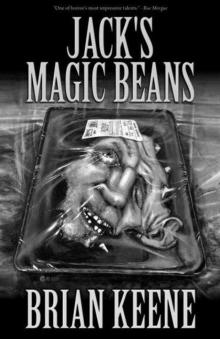 Jacks Magic Beans
Jacks Magic Beans Ghost Walk
Ghost Walk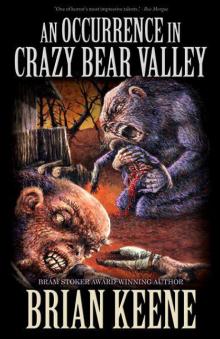 An Occurrence in Crazy Bear Valley
An Occurrence in Crazy Bear Valley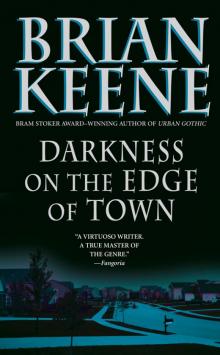 Darkness on the Edge of Town
Darkness on the Edge of Town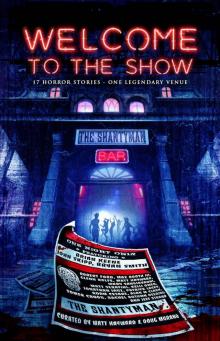 Welcome to the Show: 17 Horror Stories – One Legendary Venue
Welcome to the Show: 17 Horror Stories – One Legendary Venue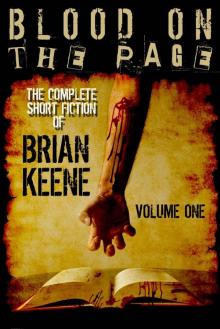 Blood on the Page: The Complete Short Fiction of Brian Keene, Volume 1
Blood on the Page: The Complete Short Fiction of Brian Keene, Volume 1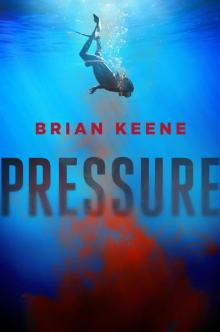 Pressure
Pressure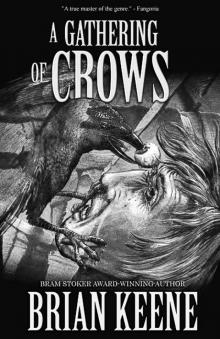 A Gathering of Crows
A Gathering of Crows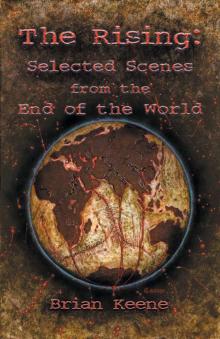 The Rising: Selected Scenes From the End of the World
The Rising: Selected Scenes From the End of the World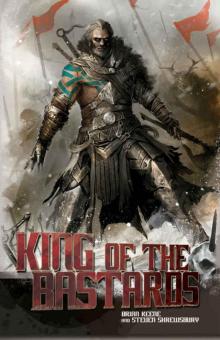 King of the Bastards
King of the Bastards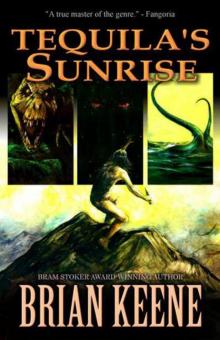 Tequila's Sunrise
Tequila's Sunrise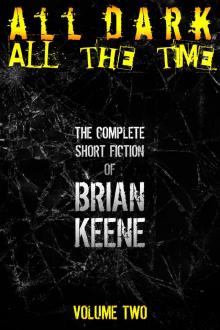 All Dark, All the Time
All Dark, All the Time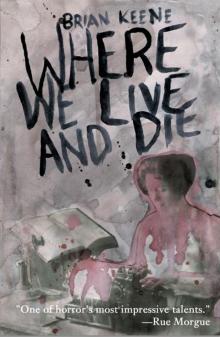 Where We Live and Die
Where We Live and Die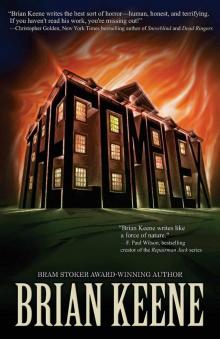 The Complex
The Complex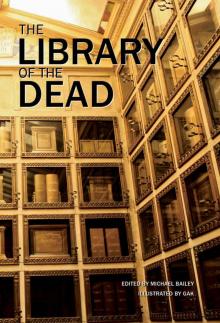 The Library of the Dead
The Library of the Dead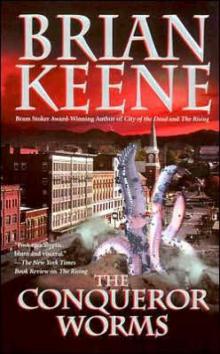 The Conqueror Worms
The Conqueror Worms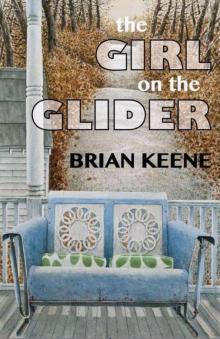 The Girl on the Glider
The Girl on the Glider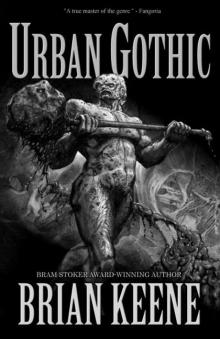 Urban Gothic
Urban Gothic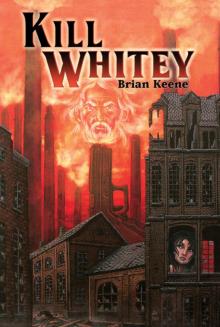 Kill Whitey
Kill Whitey Terminal
Terminal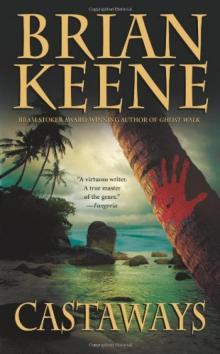 Castaways
Castaways